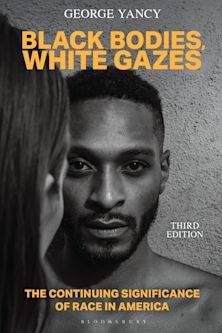Buddhism and Whiteness
Critical Reflections
Buddhism and Whiteness
Critical Reflections
Description
The motivation behind this important volume is to weave together two distinct, but we think complementary, traditions – the philosophical engagement with race/whiteness and Buddhist philosophy – in order to explore the ways in which these traditions can inform, correct, and improve each other. This exciting and critically informed volume will be the first of its kind to bring together essays that explicitly connect these two traditions and will mark a major step both in understanding race and whiteness (with the help of Buddhist philosophy) and in understanding Buddhist philosophy (with the help of philosophy of race and theorizations of whiteness). We expand upon a small, but growing, body of work that applies Buddhist philosophical analyses to whiteness and racial injustice in contemporary U.S. culture. Buddhist philosophy has much to contribute to furthering our understanding of whiteness and racial identity, the mechanisms that create and maintain white supremacy, and the possibility of dismantling white supremacy. We are interested both in the possible insights that Buddhist metaphysical, epistemological, and ethical analyses can bring to understanding race and whiteness, as well as the potential limitations of such Buddhist-inspired approaches.
In their chapters, contributors draw on Buddhist philosophical and contemplative traditions to offer fresh, insightful, and powerful perspectives on issues regarding racial identity and whiteness, including such themes as cultural appropriation, mechanisms of racial injustice and racial justice, phenomenology of racial oppression, epistemologies of racial ignorance, liberatory practices with regard to racism, Womanism, and the intersections of gender-based, raced-based, and sexuality-based oppressions. Authors make use of both contemporary and ancient Buddhist philosophical and contemplative traditions. These include various Asian traditions, including Theravada, Mahayana, Tantra, and Zen, as well as comparatively new American Buddhist traditions.
Table of Contents
Jan Willis
Introduction
Emily McRae and George Yancy
1. “We Interrupt Your Regularly Scheduled Programming to Bring You This Very Important Public Service Announcement . . .”: aka Buddhism as Usual in the Academy
Sharon Suh
2. Undoing Whiteness in American Buddhist Modernism: Critical, Collective, and Contextual Turns
Ann Gleig
3. White Delusion and Avidya: A Buddhist Approach to Understanding and Deconstructing White Ignorance
Emily McRae
4. Whiteness and the Construction of Buddhist Philosophy in Meiji Japan
Leah Kalmanson
5. Racism and Anatta: Black Buddhists, Embodiment, and Interpretations of Non-Self
Rima Vesely-Flad
6. “The Tranquil Meditator”
Laurie Cassidy
7. “Beyond Vietnam”: Martin Luther King, Jr., Thích Nh?t H?nh, and the Confluence of Black and Engaged Buddhism in the Vietnam War
Carolyn M. Jones Medine
8. The Unbearable Will to Whiteness
Jasmine Syedullah
9. Making Consciousness an Ethical Project: Moral Phenomenology in Buddhist Ethics and White Anti-Racism
Jessica Locke
10. “bell hooks Made Me a Buddhist”: Liberatory Cross-Cultural Learning—Or Is This Just Another Case of How White People Steal Everything?
Carol J. Moeller
11. Excoriating the Demon of Whiteness from Within: Disrupting Whiteness through the Tantric Buddhist Practice of Chöd and Exploring Whiteness from Within the Tradition
Lama Justin von Bujdoss
12. The Interdependence and Emptiness of Whiteness
Bryce Huebner
13. Taking and Making Refuge in Racial [Whiteness] Awareness and Racial Justice Work
Rhonda Magee
14. A Buddhist Phenomenology of the White Mind
Joy Brennan
15. The White Feminism in Rita Gross’ Critique of Gender Identities and Reconstruction of Buddhism
Hsiao Lan Hu
Afterword
Charles Johnson
Product details
| Published | 13 May 2019 |
|---|---|
| Format | Ebook (Epub & Mobi) |
| Edition | 1st |
| Extent | 384 |
| ISBN | 9781498581035 |
| Imprint | Lexington Books |
| Series | Philosophy of Race |
| Publisher | Bloomsbury Publishing |
Reviews

ONLINE RESOURCES
Bloomsbury Collections
This book is available on Bloomsbury Collections where your library has access.



































